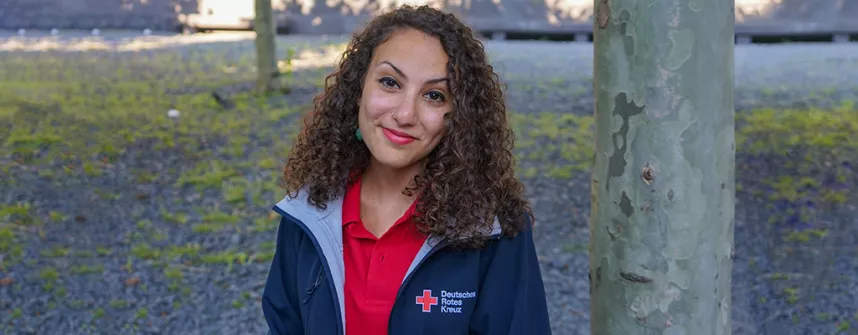Nada Hashweh cares about empowering the vulnerable
July 14, 2020
She experienced the conflict between Israelis and Palestinians at first hand. Nada Hashweh grew up in East Jerusalem, but her school was located in Ramallah in the West Bank. Every day the Palestinian Resident of East Jerusalem had to pass the checkpoints. "My experiences back home shaped a lot who I am today," says the 26-year-old, who came to Germany in 2012 to study Psychology at Jacobs University Bremen, where people from over 120 nations live, learn and do research together. Today she works for the German Red Cross in Frankfurt and takes care of the concerns of women and children with migrant backgrounds.
As a child, she commuted two to three hours daily to her school. "All the teachers knew me because I was perpetually tardy due to the controls," she remembers laughing. Hashweh belongs to the minority of Arab-Palestinians living in East Jerusalem. She attended the "Ramallah Friends School", which was founded in 1869 by American Quakers. It was the first school in Palestine to offer the International Baccalaureate.
During her school days, she participated in "Model United Nations". This simulation of the work of the UN led her to conferences in The Hague and Jordan. The experience she gained in this international environment played an important role in her choice of study location, as did her interest in psychology. "Besides, my older sister had already graduated from Jacobs University and she had told us only good things."
In 2012, she began to study Integrated Social and Cognitive Psychology. Jacobs University had offered her access to research opportunities and internships as well as a scholarship and a financial aid package. Especially the exchange with her fellow students has enriched her life long-lastingly. "The people and friends I met at Jacobs opened my eyes to the various ideas and issues related to their culture and countries which gave me a bigger understanding of the world as a whole," emphasizes Hashweh.
An internship took her back to the West Bank, to the Palestinian Counseling Center to help children in need of psychological support. Later she worked with professors from the renowned MIT, the Massachusetts Institute of Technology conducting research in the West Bank. "My motivation has always been to help those in need," she says.
After receiving a bachelor's degree in 2015, her first professional station led her to Bonn to the LVR-Klinik, the academic teaching hospital of the University of Bonn, which specializes in psychiatry, psychotherapy and neurology for children, adolescents and adults. " Even though I have deep interest in Clinical Psychology, I wanted to engage with people more naturally and build relationships. I knew I can help people in other ways and wanted to explore other avenues to achieve this," says Hashweh. She changed her plans and went back to Bremen to work for Effect, a non-profit organization of Bremen’s youth care. There she supported refugees during their integration. Her role was that of a liaison between the mostly Arabic-speaking refugees and the German authorities, doctors or employees of the organization.
Hashweh continues her work as a specialist for particularly vulnerable groups at the German Red Cross in Frankfurt. "If I have to describe my work in a few words, it is about empowering people."
She draws on experiences from her time at Jacobs University: "Jacobs University is a role model for me. It is living proof that people from different cultures and countries not only coexist but also support each other," she says, "which gives me hope for a future in which our differences are not used as fuel for destruction and war but as a catalyst to bring us closer together."
This text is part of the series "Faces of Jacobs", in which Jacobs University introduces students, alumni, professors and staff. Further episodes can be found at www.jacobs-university.de/faces.
